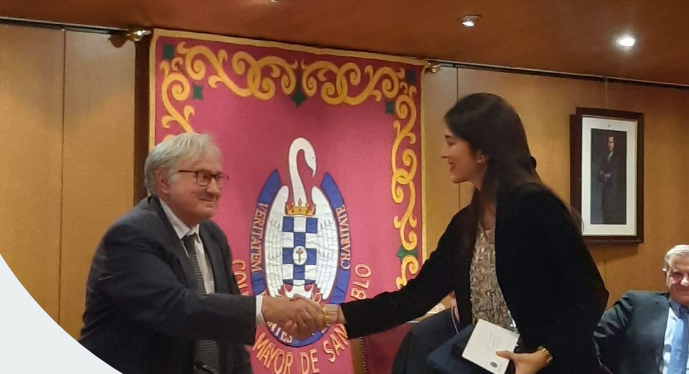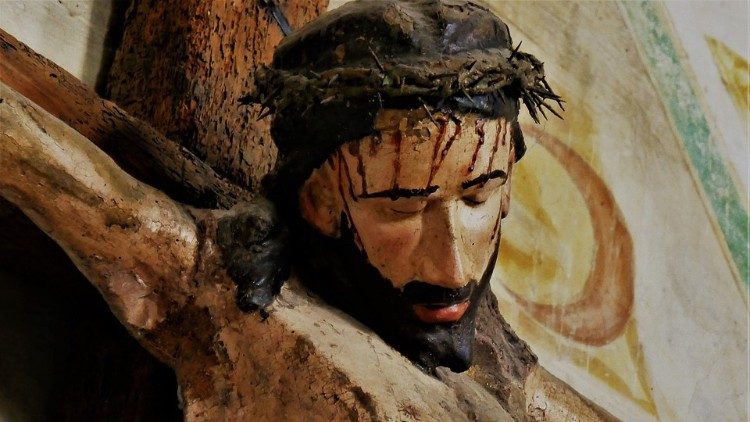Exégesis by Andrea Rodríguez Prat (Barcelona, Spain) wins the XLIV
Fernando Rielo World Prize for Mystical Poetry The event was chaired by Cardinal D. Carlos Osoro Sierra, Archbishop Emeritus of Madrid

Andrea Rodríguez-Prat (Barcelona, 1988) has won the XLIV Fernando Rielo World Prize for Mystical Poetry, which was awarded on Thursday, December 12, at a public event held at the San Pablo University College (Madrid). Tiempo de volar, by María Jesús Rosales Palencia (Ciudad Real, Spain), was unanimously awarded an Honorable Mention by the Jury of this award.
During the event, the members of the Jury spoke about how the initiative for the Prize came about and the conception of mystical poetry for Fernando Rielo, or the vision of the set of eleven finalist works and the work of the Jury from within.
In his speech, the President of the Fernando Rielo Foundation and President of the Jury, Mr. Luís Casasús, read his Message for the present edition of the Prize, inviting us to reflect on mystical poetry in today’s world, its need in our days, and even asking what poetry is, clearly. He affirmed the necessary nature of poetry today, and invited everyone to listen to, read and even write poetry, as “true therapy for a restless heart that wants to rest in true, authentic and infinite poetry.”
The Permanent Secretary of the Prize read the Minutes of the Jury, which unanimously declared the winning work to be the collection of poems Exégesis, by Andrea Rodríguez Prat, selected from among the 312 works from 32 countries that have participated in this edition.
The prize, a commemorative medal, was presented by Cardinal D. Carlos Osoro and the receipt with the Prize endowment was presented by Mr. Luis Casasús, President of the Foundation.
Andrea Rodríguez-Prat (Barcelona, 1988) has a PhD in Humanities and is a professor of Philosophical Anthropology and Ethics at the International University of Catalonia. She is also Director of the Institute of Culture and Thought, the entity responsible for all humanistic training at the aforementioned university. A researcher at the WeCare Chair: End-of-Life Care, she has various projects and publications in the field of Palliative Care on extreme experiences of human life.
The author herself says that since she can remember, “literature and particularly poetry have been a passion.”
In Exégesis, the author develops, as its title indicates, a poetic exegesis of time and space. Hence, she seeks the key to a mystery: that of a creature who, called to be light, knows itself to be immersed in darkness. The book explores this antagonism: grace and fall, light and shadows, eternity and instant. And in this attempt he summons biblical places in which he recreates his troubled experience: the paradise whose loss he notes, the inciting desert, the earthly Zion, the well of Sychar… The end of the journey is the hope of a new paradise in which heaven and earth are reconciled, and the lyrical self is substantiated in union with God.
The Jury of this prize has also awarded, unanimously, the Honorable Mention and publication of the work of the poetry collection Tiempo de volar, by María Jesús Rosales Palencia (Ciudad Real, Spain)
The World Prize for Mystical Poetry was created by Fernando Rielo in 1981 with the aim of promoting mystical poetry and finding and making known those poets who unite a high spirituality with an authentic literary expression.
The Act concluded with a recital of poems from the book Dolor entre cristales by Fernando Rielo; poems set to music by César García-Rincón de Castro, who accompanied the great baritone and lyrical singer José Robledano Cabrera on guitar and as second voice.
Related

THE WAY OF THE CROSS: Accompanying Jesus on the way to the Cross
Luis Herrera Campo
31 March, 2025
5 min

Mother Carmen Rendiles, the first Venezuelan saint proclaimed by the Universal Catholic Church
Exaudi Staff
31 March, 2025
3 min

The International Academy of Catholic Leaders: Renewal and Commitment to its Mission
Exaudi Staff
30 March, 2025
4 min

Reflection by Bishop Enrique Díaz: The Heart of the Father
Enrique Díaz
30 March, 2025
5 min
 (EN)
(EN)
 (ES)
(ES)
 (IT)
(IT)

